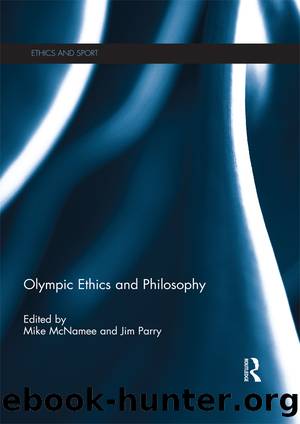Olympic Ethics and Philosophy by Unknown

Author:Unknown
Language: eng
Format: epub
ISBN: 9781317980490
Publisher: Routledge
IV. Concluding Remarks
I have argued here that the IOC’s treatment of moral principles has the potential to lead to deep confusion when addressing specific cases. I will conclude by saying something about the two distinctions with which the article began.
The distinction between the moral evaluation of cases and the ethical environment is important in relation to the Fundamental Principles of Olympism because an apparent failure to recognise that distinction on the part of the IOC seems to lead to the evaluation of cases on the basis of general moral principles. This is a poor basis for the evaluation of cases. However, it is not true to say that the Fundamental Principles of Olympism have nothing to contribute to the ethical environment. There are important considerations with regard to ethnocentrism and multiculturalism if the Fundamental Principles of Olympism are to contribute responsibly to the ethical environment, but that possibility is in no way ruled out by the fact that general moral principles cannot be the basis of the moral evaluation of cases because the evaluation of cases is distinctly different from the ethical environment.
It would seem that there could be a worthwhile role for the Fundamental Principles of Olympism, albeit with issues of corruption and inequality suitably addressed. If the Fundamental Principles of Olympism are part of general moral talk, rather than as tools for working out the answer to specific cases, then they may contribute something to the supposedly humanitarian and morally praiseworthy goals of the IOC. Of course, there are all sorts of problems around universalism and multiculturalism in this regard (see Parry 2004), but no organisation with global humanitarian goals should expect to find a route to those goals that is free of problems.
The distinction drawn here between the moral and that which is practical in morally-laden contexts also suggests that there is confusion in the IOC’s approach to the evaluation of cases. It’s often unclear what are practical considerations and what are moral ones. By this, I do not mean that we should aim to produce a list of considerations that are always practical and a list of considerations that are always moral. I would hope that it is perfectly clear by now that such an approach is precisely the kind of way of addressing these matters that I think should be avoided. What is a practical matter and what is a moral matter depends on the context of the case. For example, the idea of strict liability could be viewed as defeasible in the context of there being some kind of contract into which athletes enter in participating. In other words, strict liability would not be an exceptionless generalisation, but a feature of a contract that could be defeated by ‘recognised heads of exception’ (McFee 2004, 124; also see McFee 1992, 61–3).
In such circumstances the important issue is what will constitute recognised heads of exception. In cases of defeasible judgements the burden of proof lies with the objector, who must show that one of the recognised
Download
This site does not store any files on its server. We only index and link to content provided by other sites. Please contact the content providers to delete copyright contents if any and email us, we'll remove relevant links or contents immediately.
Cecilia; Or, Memoirs of an Heiress — Volume 2 by Fanny Burney(31956)
Cecilia; Or, Memoirs of an Heiress — Volume 3 by Fanny Burney(31941)
Fanny Burney by Claire Harman(26602)
We're Going to Need More Wine by Gabrielle Union(19045)
Plagued by Fire by Paul Hendrickson(17412)
All the Missing Girls by Megan Miranda(16023)
Cat's cradle by Kurt Vonnegut(15351)
For the Love of Europe by Rick Steves(14121)
Bombshells: Glamour Girls of a Lifetime by Sullivan Steve(14073)
Leonardo da Vinci by Walter Isaacson(13336)
4 3 2 1: A Novel by Paul Auster(12391)
The remains of the day by Kazuo Ishiguro(8998)
Adultolescence by Gabbie Hanna(8927)
Note to Self by Connor Franta(7670)
Diary of a Player by Brad Paisley(7574)
Giovanni's Room by James Baldwin(7346)
What Does This Button Do? by Bruce Dickinson(6207)
Ego Is the Enemy by Ryan Holiday(5445)
Born a Crime by Trevor Noah(5382)
